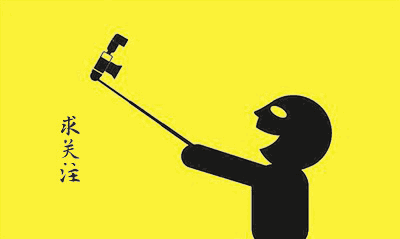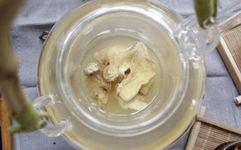Dried Ginger (Gan Jiang), a traditional Chinese medicine, is the dried rhizome of the ginger plant (Zingiber officinale). It is harvested in winter, with the fibrous roots and soil removed, and then dried at low temperatures. The fresh slices that are dried at low temperatures are referred to as “Dried Ginger Slices”.
Medicinal Value:
It warms the middle, disperses cold, restores yang, and opens the meridians. It is used for cold pain in the abdomen, vomiting, diarrhea, cold limbs with weak pulse, and cold phlegm causing wheezing. 1. Used for treating spleen and stomach deficiency cold, abdominal pain with diarrhea, and cold phlegm in the stomach, with a preference for salivation: Ren Shen (Ginseng), Gan Jiang (Dried Ginger), Bai Zhu (White Atractylodes), and Gan Cao (Licorice). This is the formula Li Zhong Tang (Regulate the Middle Decoction). (From “Shang Han Lun”)
2. Used for treating cold-induced diarrhea: Dried ginger (processed) ground into powder, taken with two qian (6 grams). (From “Qian Jin Fang”)
3. Used for treating cold dysentery with a bluish color: Dried ginger cut into bean-sized pieces, taken with six or seven pieces of dried shrimp, three times a day. (From “Bu Xie Zhou Hou Fang”)
4. Used for treating persistent vomiting during pregnancy: Dried ginger and ginseng each one liang (30 grams), Ban Xia (Pinellia) two liang (60 grams). Grind these three ingredients into powder, form into pills the size of a walnut. Take ten pills three times a day. This is similar to Ren Shen Ban Xia Wan (Ginseng and Pinellia Pill). (From “Jin Gui Yao Lue”)
5. For treating dizziness and vomiting: Chuan Gan Jiang (Sichuan Dried Ginger) two liang (60 grams, processed), Gan Cao (Licorice) one liang (30 grams, roasted until red). Grind these two ingredients into coarse powder. Take four or five qian (12-15 grams) with two cups of water, decoct until reduced to one cup, and take hot before meals. (From “Chuan Xin Shi Yong Fang” Zhi Ni Tang)
6. For treating recurrence of sweating after a cold, with daytime restlessness and inability to sleep, quiet at night, no vomiting or thirst, and a weak pulse without exterior symptoms: Dried ginger one liang (30 grams), Fu Zi (Aconite) one piece (raw, peeled, cut into eight slices). Boil these two ingredients in three sheng (900 ml) of water until one sheng (300 ml) remains, discard the dregs, and take it all at once. (From “Shang Han Lun” Gan Jiang Fu Zi Tang)
7. For treating cold malaria: (1) Dried ginger and Gao Liang Jiang (Galanga) in equal parts, ground into powder. Take one qian (3 grams) with one cup of water, decoct until reduced to seven parts. (2) Dried ginger roasted black, ground into powder, taken with warm wine three qian (9 grams) at the onset. (From “Wai Tai”)
8. For treating persistent vomiting of blood: Dried ginger ground into powder, taken with a small amount of a boy’s urine, one qian (3 grams). (From “Qian Jin Fang”)
9. For treating vomiting and bloody diarrhea: Dang Gui (Angelica), E Jiao (Donkey-hide Gelatin) each eight fen (24 grams), Chuan Xiong (Szechuan Lovage) five fen (15 grams), Pu Huang (Cattail Pollen) one qian (3 grams), Bai Ye (Cypress Leaf) one qian five fen (4.5 grams), and roasted ginger carbonized seven fen (21 grams). Decoct in water, and take with Bai Cao Shuang (Herbal Powder). (From “Guan Ju Fang Yao Bu” Duan Hong Yin)
10. For treating spleen and stomach deficiency, reduced appetite, difficulty in digestion, weakness, and emaciation: Dried ginger (frequently ground) four liang (120 grams), cut into pieces with white syrup, water-bathed, melted in an iron pot, and formed into pills the size of a walnut. Take thirty pills on an empty stomach with rice wine. (From “Shi Bian Liang Fang”)
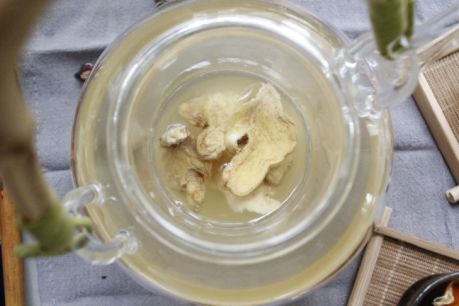
1. Water Quantity: Use a base ratio of five bowls (1000 ml) of water for every jin (500 grams) of fresh ginger slices or one liang (50 grams) of dried ginger, adjusting the water quantity based on the amount of ginger used.
2. Decoction: The key is concentration. The ginger soup should be concentrated to one-third of the added water volume (for example, if five bowls of water are added, it should be reduced to about 1.7 bowls). Use a regular stove or gas stove to bring to a boil, then reduce to low heat for about 3-4 hours; if using an electric pot, it will take 4-5 hours, and avoid lifting the lid during this time. Excessive moisture can burden severely ill patients, so it can be made stronger if necessary.
3. Seasoning: If pure ginger soup is too spicy, a small amount of Gan Cao (Licorice), Long Yan Gan (Longan), or brown sugar can be added for flavor. However, these seasonings are all cold in nature, so do not add too much.
4. Storage: Ginger soup should not be stored for long. It should be consumed within 12 hours; if not, it can be kept at room temperature or refrigerated after cooling, but it must be reheated before consumption. If it changes in taste, it indicates spoilage and should not be consumed. For severely ill patients, it is best to prepare and use it on the same day.
Application of Internal and External Heat Sources
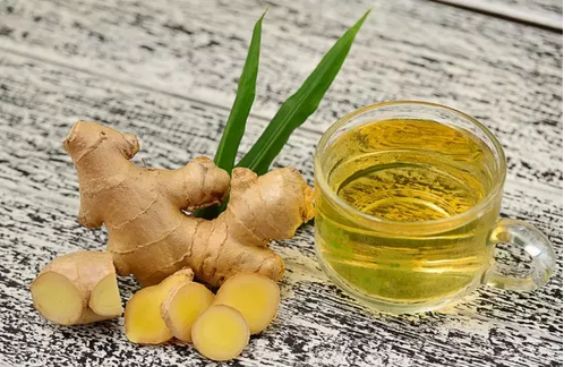
(1) Internal Heat Source
Taking ginger soup as an internal heat source is its main use. It should be taken warm, regardless of the time, morning, noon, or night. The dosage depends on the condition; those unaccustomed should start gradually, beginning with a few liang and increasing to one jin (500 grams), two jin (1000 grams), three jin (1500 grams), or even six jin (3000 grams) if necessary. However, do not simply increase the amount of ginger; patients should only increase the dosage if their condition does not significantly improve with comprehensive measures such as acupressure, warm compresses, exercise, emotional regulation, and warm food.
Ginger soup made with dried ginger is best, as its medicinal properties surpass those of fresh ginger slices, being strong yet not harsh, with a better taste and easier absorption. The dosage can be calculated based on the proportion of dried ginger that can be made from fresh ginger, depending on the origin and variety of the ginger used.
(2) External Heat Source
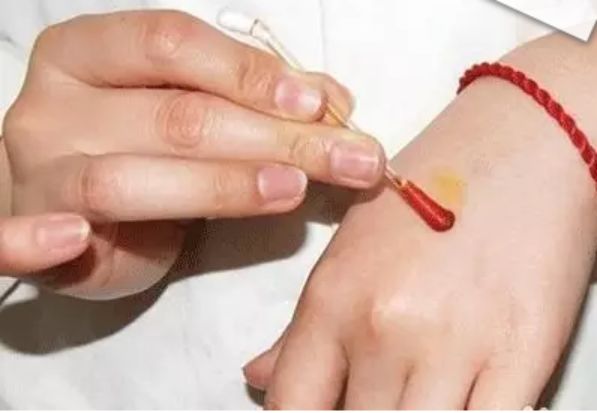
For wounds or skin diseases, warm ginger soup can be used to wash or wipe the affected area. When washing, the ginger soup should not be too concentrated, and after cleaning the wound, ginger powder should be sprinkled to keep it dry.

